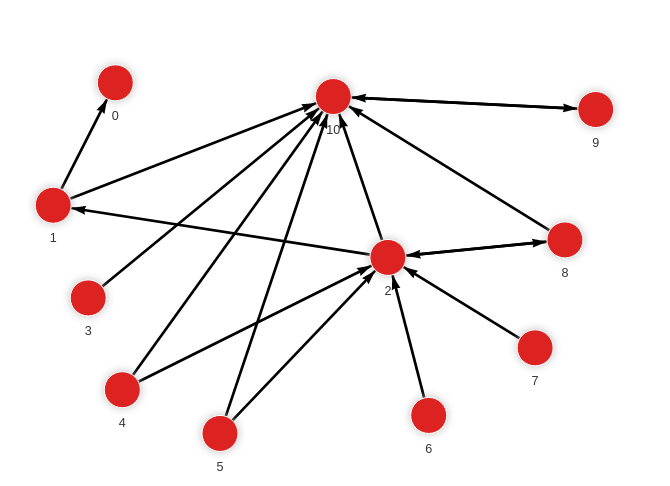katz_centrality
Katz Centrality is the measurement of centrality that incorporates the inbound path length starting from the wanted node. More central nodes will have closer connections rather than having many long-distance nodes connected to them.
The implemented algorithm is based on the work of Alexander van der Grinten et. al. called Scalable Katz Ranking Computation in Large Static and Dynamic Graphs. The author proposes an estimation method that preserves rankings for both static and dynamic Katz centrality scenarios.
Theoretically speaking there exists an attenuation factor (alpha^i) smaller
than 1 which is applied to walks of length i. If w_i(v) is the number of
walks of length i starting from node v, Katz centrality is defined as:
Centrality(v) = sum { w_i(v) * alpha ^ i}The constructed algorithm computes Katz centrality by iteratively improving the upper and lower bounds on centrality scores. This guarantees that centrality rankings will be correct, but it does not guarantee that the corresponding resulting centralities will be correct.
| Trait | Value |
|---|---|
| Module type | algorithm |
| Implementation | C++ |
| Graph direction | directed |
| Edge weights | unweighted |
| Parallelism | sequential |
Procedures
You can execute this algorithm on graph projections, subgraphs or portions of the graph.
get()
The procedure calculates Katz Centrality.
Input:
subgraph: Graph(OPTIONAL) ➡ A specific subgraph, which is an object of type Graph returned by theproject()function, on which the algorithm is run. If subgraph is not specified, the algorithm is computed on the entire graph by default.alpha: double (default=0.2)➡ Exponential decay factor defining the walk length importance.epsilon: double (default=1e-2)➡ Convergence tolerance. Minimal difference in two adjacent pairs of nodes in the final ranking.
Output:
node➡ Node in the graph, for which Katz Centrality is calculated.rank➡ Normalized ranking of a node. Expresses the centrality value after bound convergence
Usage:
Use the following query to calculate Katz Centrality:
CALL katz_centrality.get()
YIELD node, rank;Example
Database state
The database contains the following data:

Created with the following Cypher queries:
MERGE (a:Node {id: 1}) MERGE (b:Node {id: 0}) CREATE (a)-[:RELATION]->(b);
MERGE (a:Node {id: 1}) MERGE (b:Node {id: 10}) CREATE (a)-[:RELATION]->(b);
MERGE (a:Node {id: 2}) MERGE (b:Node {id: 1}) CREATE (a)-[:RELATION]->(b);
MERGE (a:Node {id: 2}) MERGE (b:Node {id: 8}) CREATE (a)-[:RELATION]->(b);
MERGE (a:Node {id: 2}) MERGE (b:Node {id: 10}) CREATE (a)-[:RELATION]->(b);
MERGE (a:Node {id: 3}) MERGE (b:Node {id: 10}) CREATE (a)-[:RELATION]->(b);
MERGE (a:Node {id: 4}) MERGE (b:Node {id: 10}) CREATE (a)-[:RELATION]->(b);
MERGE (a:Node {id: 4}) MERGE (b:Node {id: 2}) CREATE (a)-[:RELATION]->(b);
MERGE (a:Node {id: 5}) MERGE (b:Node {id: 10}) CREATE (a)-[:RELATION]->(b);
MERGE (a:Node {id: 5}) MERGE (b:Node {id: 2}) CREATE (a)-[:RELATION]->(b);
MERGE (a:Node {id: 6}) MERGE (b:Node {id: 2}) CREATE (a)-[:RELATION]->(b);
MERGE (a:Node {id: 7}) MERGE (b:Node {id: 2}) CREATE (a)-[:RELATION]->(b);
MERGE (a:Node {id: 8}) MERGE (b:Node {id: 2}) CREATE (a)-[:RELATION]->(b);
MERGE (a:Node {id: 8}) MERGE (b:Node {id: 10}) CREATE (a)-[:RELATION]->(b);
MERGE (a:Node {id: 9}) MERGE (b:Node {id: 10}) CREATE (a)-[:RELATION]->(b);
MERGE (a:Node {id: 10}) MERGE (b:Node {id: 9}) CREATE (a)-[:RELATION]->(b);Calculate Katz centrality
Get values using the following query:
CALL katz_centrality.get()
YIELD node, rank
RETURN node, rank;Results:
+------------------+------------------+
| node | rank |
+------------------+------------------+
| (:Node {id: 9}) | 0.544 |
| (:Node {id: 7}) | 0 |
| (:Node {id: 6}) | 0 |
| (:Node {id: 5}) | 0 |
| (:Node {id: 4}) | 0 |
| (:Node {id: 3}) | 0 |
| (:Node {id: 8}) | 0.408 |
| (:Node {id: 2}) | 1.08 |
| (:Node {id: 10}) | 1.864 |
| (:Node {id: 0}) | 0.28 |
| (:Node {id: 1}) | 0.408 |
+------------------+------------------+